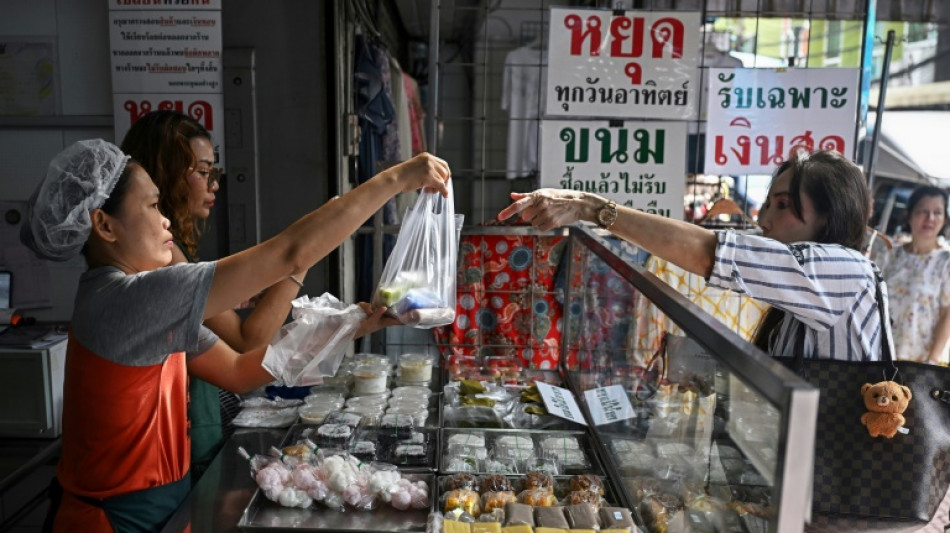
-
 Naib's fifty lifts Afghanistan to 182-6 against New Zealand
Naib's fifty lifts Afghanistan to 182-6 against New Zealand
-
Paul Thomas Anderson wins top director prize for 'One Battle After Another'

-
 De Beers sale drags in diamond doldrums
De Beers sale drags in diamond doldrums
-
NFL embraces fashion as league seeks new audiences

-
 What's at stake for Indian agriculture in Trump's trade deal?
What's at stake for Indian agriculture in Trump's trade deal?
-
Real Madrid can wait - Siraj's dream night after late T20 call-up

-
 Castle's monster night fuels Spurs, Rockets rally to beat Thunder
Castle's monster night fuels Spurs, Rockets rally to beat Thunder
-
Japan votes in snow-hit snap polls as Takaichi eyes strong mandate

-
 Pakistan's capital picks concrete over trees, angering residents
Pakistan's capital picks concrete over trees, angering residents
-
Berlin's crumbling 'Russian houses' trapped in bureaucratic limbo

-
 Neglected killer: kala-azar disease surges in Kenya
Neglected killer: kala-azar disease surges in Kenya
-
Super Bowl set for Patriots-Seahawks showdown as politics swirl

-
 Sengun shines as Rockets rally to beat NBA champion Thunder
Sengun shines as Rockets rally to beat NBA champion Thunder
-
Matsuyama grabs PGA Phoenix Open lead with Hisatsune one back

-
 Washington Post CEO out after sweeping job cuts
Washington Post CEO out after sweeping job cuts
-
Haiti's transitional council hands power to PM

-
 N. Korea to hold party congress in February, first since 2021
N. Korea to hold party congress in February, first since 2021
-
Thailand votes after three leaders in two years

-
 Swiss joy as Von Allmen wins first gold of Winter Olympics
Swiss joy as Von Allmen wins first gold of Winter Olympics
-
George backs England to 'kick on' after Six Nations rout of Wales

-
 Malinin upstaged as Japan keep pressure on USA in skating team event
Malinin upstaged as Japan keep pressure on USA in skating team event
-
Japan's Kimura soars to Olympic gold in snowboard big air final

-
 Vail's golden comets Vonn and Shiffrin inspire those who follow
Vail's golden comets Vonn and Shiffrin inspire those who follow
-
Veteran French politician loses culture post over Epstein links

-
 Japan's Kimura wins Olympic snowboard big air gold
Japan's Kimura wins Olympic snowboard big air gold
-
Arteta backs confident Gyokeres to hit 'highest level'

-
 Hojlund the hero as Napoli snatch late win at Genoa
Hojlund the hero as Napoli snatch late win at Genoa
-
England's Arundell 'frustrated' despite hat-trick in Wales romp

-
 Lollobrigida skates to first Italian gold of Winter Olympics on her birthday
Lollobrigida skates to first Italian gold of Winter Olympics on her birthday
-
Arundell hat-trick inspires England thrashing of Wales in Six Nations opener

-
 Chile's climate summit chief to lead plastic pollution treaty talks
Chile's climate summit chief to lead plastic pollution treaty talks
-
Rosenior hails 'unstoppable' Palmer after treble tames Wolves

-
 French ex-minister offers resignation from Paris cultural hub over Epstein links
French ex-minister offers resignation from Paris cultural hub over Epstein links
-
New NBA dunk contest champ assured and shooting stars return

-
 Shiffrin says will use lessons learnt from Beijing flop at 2026 Games
Shiffrin says will use lessons learnt from Beijing flop at 2026 Games
-
Takaichi tipped for big win as Japan votes

-
 Lens return top of Ligue 1 with win over Rennes
Lens return top of Ligue 1 with win over Rennes
-
Shiffrin learning from Beijing lessons ahead of Milan-Cortina bow

-
 Demonstrators in Berlin call for fall of Iran's Islamic republic
Demonstrators in Berlin call for fall of Iran's Islamic republic
-
'Free the mountains!": clashes at Milan protest over Winter Olympics

-
 Townsend accepts pressure will mount on him after Italy defeat
Townsend accepts pressure will mount on him after Italy defeat
-
BMW iX3 new style and design

-
 Suryakumar's 84 leads India to opening win over USA in T20 World Cup
Suryakumar's 84 leads India to opening win over USA in T20 World Cup
-
Lollobrigida skates to first Italian gold of Milan-Cortina Games

-
 Barca beat Mallorca to extend Liga lead
Barca beat Mallorca to extend Liga lead
-
Gyokeres lifts Arsenal nine clear as Man Utd pile pressure on Frank

-
 Late Guirassy winner for Dortmund trims Bayern's lead atop Bundesliga
Late Guirassy winner for Dortmund trims Bayern's lead atop Bundesliga
-
'Free the mountains!": protest in Milan over Winter Olympics

-
 Gyokeres double helps Arsenal stretch Premier League lead
Gyokeres double helps Arsenal stretch Premier League lead
-
New Skoda Epiq: modern with range


How single-use plastic still rules the world
Each year the world produces around 400 million tonnes of plastic waste, much of it discarded after just a few minutes of use.
Negotiators hope to reach the world's first treaty on plastic pollution this year, but across five very different countries, AFP found single-use plastic remains hugely popular as a cheap and convenient choice, illustrating the challenges ahead:
Bangkok
On a Bangkok street lined with food vendors, customers line up for Maliwan's famed traditional sweets.
Steamed layer cakes -- green with pandan leaf or blue with butterfly pea -- sit in clear plastic bags alongside rows of taro pudding in plastic boxes.
Each day, the 40-year-old business uses at least two kilos of single-use plastic.
"Plastic is easy, convenient and cheap," said 44-year-old owner Watchararas Tamrongpattarakit.
Banana leaves used to be standard, but they are increasingly expensive and hard to source.
They are also onerous to use because each one must be cleaned and checked for tears.
It "isn't practical for our pace of sales", said Watchararas.
Thailand started limiting single-use plastic before the pandemic, asking major retailers to stop handing out bags for free.
But the policy has largely fallen by the wayside, with little uptake among the country's street food vendors.
Thailand produces two million tons of plastic waste a year, according to the country's Pollution Control Department.
The World Bank estimates 11 percent goes uncollected, and is burned, disposed of on land or leaks into rivers and the ocean.
Watchararas tries to consolidate purchases into fewer bags and said some customers bring their own reusable containers and totes.
But Radeerut Sakulpongpaisal, a Maliwan customer for 30 years, said she finds plastic "convenient".
"I also understand the environmental impact," the bank worker said.
But "it's probably easier for both the shop and the customers".
Lagos
In the Obalende market at the heart of Nigeria's economic capital Lagos, emptied water sachets litter the ground.
Each day, Lisebeth Ajayi watches dozens of customers use their teeth to tear open the bags of "pure water" and drink.
"They don't have the money to buy the bottle water, that's why they do the pure water," said the 58-year-old, who sells bottles and bags of water, soap and sponges.
Two 500-millilitre sachets sell for between 50 to 250 naira (3-15 US cents), compared to 250-300 naira for a 750-ml bottle.
Since they appeared in the 1990s, water sachets have become a major pollutant across much of Africa, but they remain popular for drinking, cooking and even washing.
Around 200 firms produce the sachets in Lagos, and several hundred more recycle plastic, but supply vastly outstrips capacity in a country with few public wastebins and little environmental education.
Lagos banned single-use plastic in January, but with little impact so far.
The United Nations estimates up to 60 million water sachets are discarded across Nigeria every day.
Rio
Each day, vendors walk the sands of some of Rio de Janeiro's most beautiful beaches, lugging metal containers filled with the tea-like drink mate.
The iced beverage, infused with fruit juice, is dispensed into plastic cups for eager sun worshippers dotted along the seafront.
"Drinking mate is part of Rio de Janeiro's culture," explained Arthur Jorge da Silva, 47, as he scouted for customers.
He acknowledged the environmental impacts of his towers of plastic cups, in a country ranked the fourth-biggest producer of plastic waste in 2019.
But "it's complicated" to find affordable alternatives, he told AFP.
The tanned salesman said mate vendors on the beach had used plastic for as long as he could remember.
He pays a dollar for a tower of 20 cups and charges customers $1.80 for each drink.
Bins along Rio's beaches receive about 130 tons of waste a day, but plastic is not separated, and just three percent of Brazil's waste is recycled annually.
Evelyn Talavera, 24, said she does her best to clean up when leaving the beach.
"We have to take care of our planet, throw the garbage away, keep the environment clean."
Plastic straws have been banned in Rio's restaurants and bars since 2018, and shops are no longer required to offer free plastic bags -- though many still do.
Congress is also considering legislation that would ban all single-use plastic.
Paris
In France, single-use plastic has been banned since 2016, but while items like straws and plastic cutlery have disappeared, plastic bags remain stubbornly common.
At Paris' Aligre market, stalls are piled with fruit, vegetables and stacks of bags ready to be handed out.
Most are stamped "reusable and 100-percent recyclable", and some are described as compostable or produced from natural materials.
But experts have cast doubt on the environmental relevance of some of these claims.
Vendor Laurent Benacer gets through a 24-euro ($26) box of 2,000 bags each week.
"In Paris, everyone asks for a bag," he told AFP.
"I'd stopped, but my neighbours continued, so I had to restart."
There are alternatives like paper bags, but some customers are simply not convinced.
"Plastic bags remain practical, so everything doesn't spill everywhere," insisted 80-year-old customer Catherine Sale.
Dubai
At the Allo Beirut restaurant in Dubai, plastic containers are piled high, waiting to be filled and delivered across the city.
"We receive more than 1,200 orders a day," said delivery manager Mohammed Chanane.
"We use plastic boxes because they are more airtight, and better preserve the food," he said.
With few pedestrians and an often-scorching climate, many of Dubai's 3.7 million residents rely on delivery for everything from petrol to coffee.
Residents of the United Arab Emirates have one of the highest volumes of waste per capita in the world.
And single-use plastic accounts for 40 percent of all plastic used in the country.
Since June, single-use plastic bags and several similar items have been banned. Polystyrene containers will follow next year.
Allo Beirut is considering using cardboard containers, a move customer Youmna Asmar would welcome.
She admitted horror at the build-up of plastic in her bins after a weekend of family orders.
"I say to myself, if all of us are doing this, it's a lot."
burs/sah/sco/fg
H.Nasr--SF-PST




